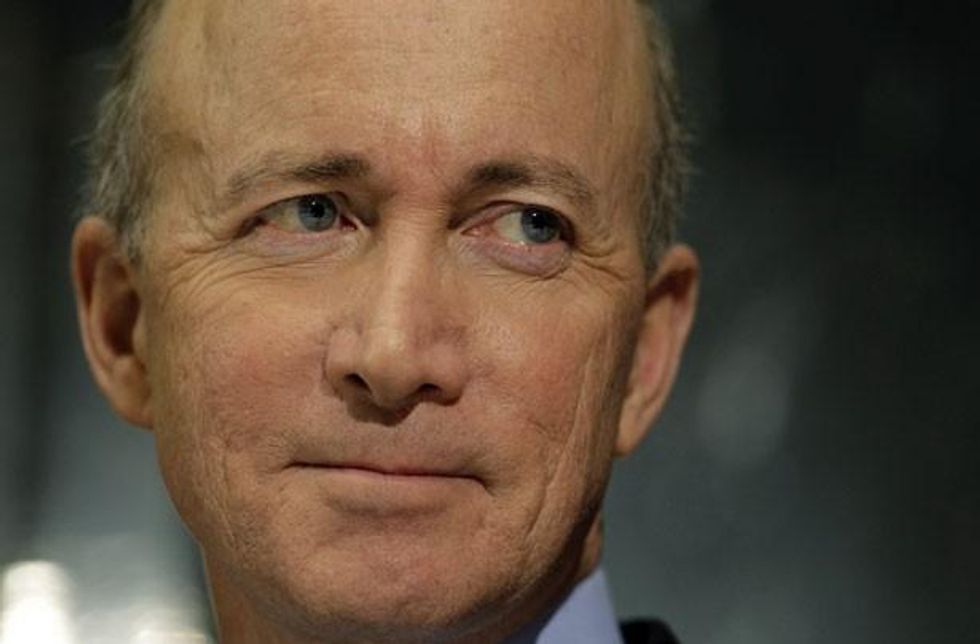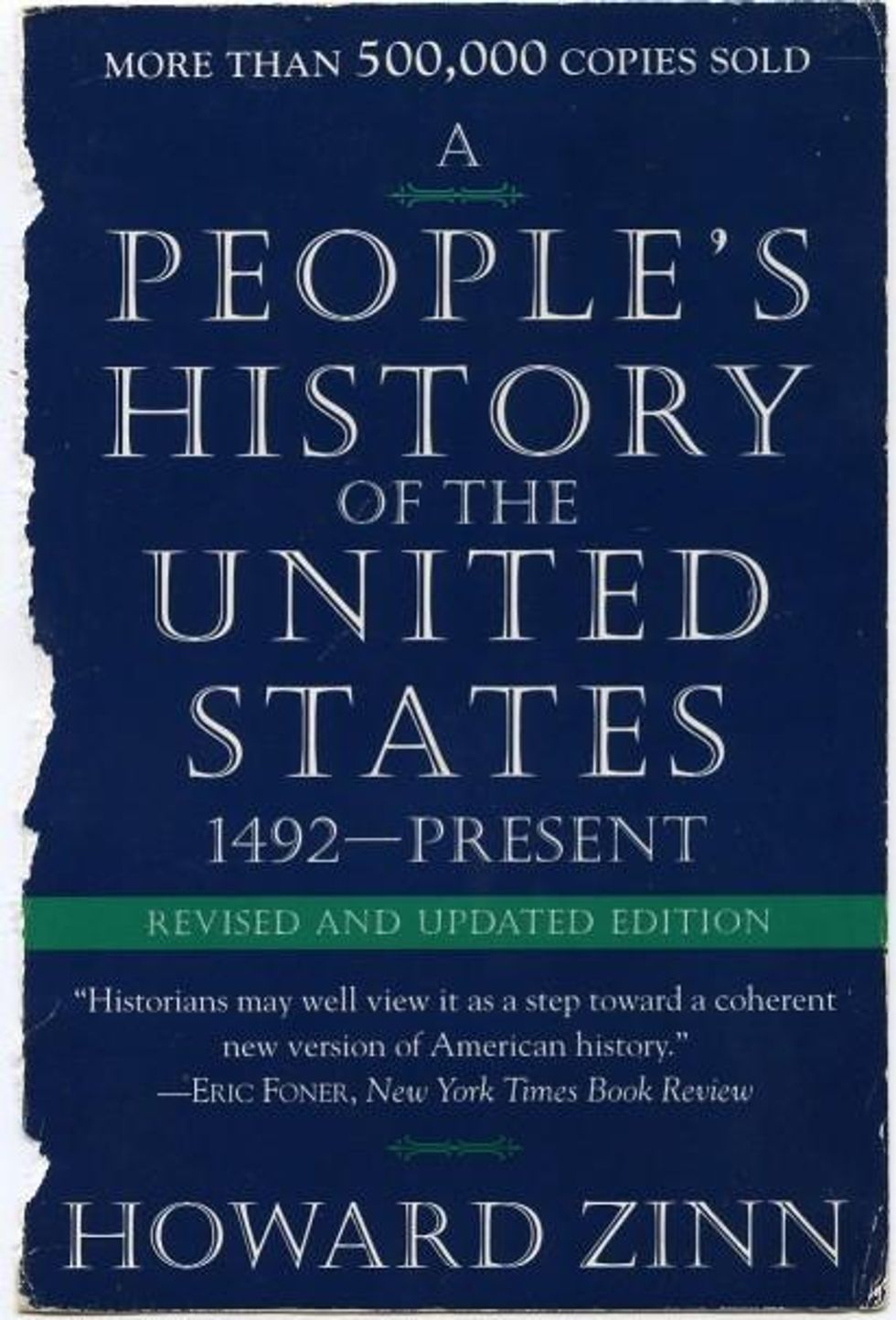A recent Associated Press expose--drawing on e-mails obtained under the Freedom of Information Act--revealed that in 2010, Mitch Daniels, then Indiana's Republican governor, covertly set out to ban Howard Zinn's best-selling
A People's History of the United States from Indiana's classrooms. Daniels had privately responded to Zinn's death that year with unseemly glee; "This terrible anti-American academic has finally passed away," he crowed. Daniels attempted to banish Zinn's book on the grounds that it was "a truly execrable, anti-factual piece of disinformation that misstates American history on every page.... How do we get rid of it before more young people are force-fed a totally false version of our history?" When Daniels's education adviser replied that
A People's History was being used in a social movements course for teachers at Indiana University, the governor insisted that "this crap should not be accepted for any credit by the state," sparking a proposed statewide review of university courses designed to "disqualify propaganda" from Indiana's curriculum.
This view of A People's History as propaganda was not shared by the historians who named it a finalist for the American Book Award in 1981--an honor virtually never accorded to historical surveys--or by the more than 2 million readers who made A People's History the most popular radical history in the United States during the last three decades.
As governor, Daniels seemed unconcerned that purging Zinn from Indiana's educational system constituted a violation of academic freedom. But this issue emerged in the political storm unleashed by the AP story, in part because Daniels is currently president of Purdue University. Aware that trampling academic freedom is incompatible with leadership in higher education, Daniels sought to evade the issue by claiming (falsely) that he had respected academic freedom at the university level and only sought to keep Zinn out of the K-12 educational curriculum.
Upset by Daniels's refusal to admit last week that he had erred in seeking to ban Zinn, dozens of Purdue's faculty, including some of its most prominent historians, wrote an open letter explaining how "troubled" they were by his failure either to stand up for "academic inquiry and exchange" or to realize that "academic freedom is essential to all levels of education." The American Historical Association condemned Daniels's war on Zinn as "inappropriate and a violation of academic freedom," and championed "open discussion of controversial books," which "benefits students, historians, and the general public alike." "Attempts to single out particular texts for suppression from a school or university curriculum," the AHA wrote, "have no place in a democratic society."
Governor Daniels assumed, without evidence, that teachers "inflicted" Zinn's book on their students and "force-fed" them Zinn's radical view of the American past, indoctrinating them with leftist "propaganda." But the way that A People's History has most commonly been used in history classes bears no resemblance to Daniels's overheated, ideological imaginings. For example, the Indiana University professor, Carl Weinberg, whose use of A People's History so angered Daniels in 2010, assigned the book's civil rights movement chapter, along with conflicting accounts of the movement, in order to explore competing theories about how social movements arise--just what one would expect and hope for in a class on mass protest.
Innovative history teachers across the United States have for decades used A People's History at the high school level in similarly comparative and rigorous ways. High school teachers desperate to breathe some life into their classes have distributed Xerox copies of Zinn's most provocative chapters to offer a contrast to state-mandated textbooks, seeking to engage students in historical debate so they learn that history involves sorting out competing interpretations of the past rather than mere memorization of names and dates. These teachers have been drawn to Zinn because he offered their students a uniquely accessible introduction to the new social history, which revolutionized historical scholarship beginning in the 1960s. As its title indicates, A People's History presented American history "from the bottom up" focusing on the experience of workers, women, African-Americans and Native Americans; it brought a New Left sensibility to the analysis of foreign policy and was profoundly critical of the US tendencies towards violence, expansionism, racism and militarism from the Indian Wars up through Vietnam.
Extensive evidence in the Zinn archives at NYU's Tamiment Library, including student and teacher letters, shows that students develop their historical thinking skills when their teachers have them compare Zinn's radical history with conventional textbook history. For example, more than 100 Oregon high school students wrote Zinn in the 1980s and 1990s as part of their class work comparing their textbook's account of Columbus, Andrew Jackson, the Progressive era and various wars in which the US engaged with Zinn's treatment of those topics in A People's History. Most of the students were startled to learn that Columbus, who their textbook depicted as a heroic explorer, can also be seen as a greed-driven imperialist who was cruel to the indigenous people of the "New World." They were shocked to learn that Andrew Jackson, a democratic icon of textbook history, was an Indian killer and slave-owner.
Some students admired Zinn's iconoclasm, while others challenged his version of the past. But whether or not they found his radical view of the American past convincing, most students found it liberating to learn that there was more than one way to think about history. As one student wrote Zinn, "American history has been entirely one-sided for too long. Your work showed me another side of history I never knew existed."
Another wrote that he "really enjoyed reading your work and value it much when it comes to discussing our history.... Our history books should be rewritten, told, and questioned from more than one perspective."
A student who told Zinn he disagreed with his negative portrayal of President Jackson's Indian removal policies was still glad to have access to Zinn's telling of US history: "It was incredible to read something so extremely different than the account given in history [text] books." "I rather enjoy your writings and it gives a different point of view other than the fairy tale history books," explained a student who challenged some of Zinn's conclusions.
Even a conservative student came to appreciate Zinn, writing, "I'm still a conservative, and I still love America, but your articles make me take a look at America from a different angle." Some right-wing students did display Mitch Daniels-type intolerance towards Zinn's radicalism by suggesting he was unpatriotic. In response, a number of their classmates wrote to Zinn to describe refutations of such attacks. "On the contrary, I feel that you are one who is tired of people lying to themselves about the 'greatness' of our country, and only dwelling on positive achievements," wrote one such student, "So if people with our thoughts and opinions are to be thought of as 'Anti-Americans," then let us be known that way. I'll stand by that name proudly."
Some of the most memorable letters to Zinn might even leave Mitch Daniels embarrassed about his ugly characterization of Zinn as "an anti-American academic." There is the letter from a teacher on a South Dakota Indian reservation who reported that one of her students was so moved by A People's History that he had "stayed up all night...and could not put the book down." A Japanese-American student wrote that she was "part of a minority called the 'Quiet Americans;'" her parents had "as young children been sent to the concentration camps," and she told Zinn that he was the first historian she'd read who "tells the side of the minority.... It's really nice to know that there is someone our there that doesn't go with the flow and follow the majority."
These letters attest that, unlike Daniels, students are not afraid of radical history, but thrive by reading and debating it.


